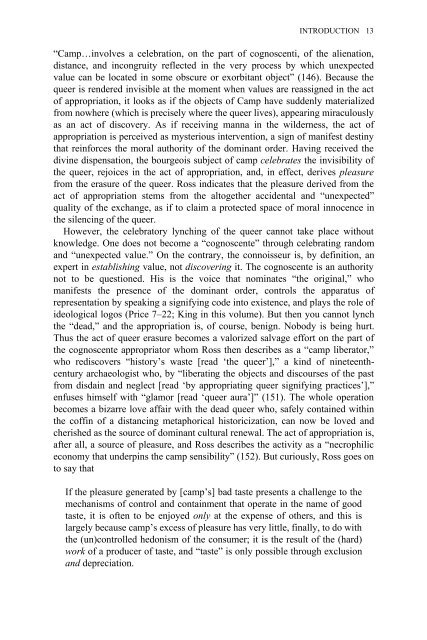Edited by Moe Meyer - Get a Free Blog
Edited by Moe Meyer - Get a Free Blog
Edited by Moe Meyer - Get a Free Blog
Create successful ePaper yourself
Turn your PDF publications into a flip-book with our unique Google optimized e-Paper software.
INTRODUCTION 13<br />
“Camp…involves a celebration, on the part of cognoscenti, of the alienation,<br />
distance, and incongruity reflected in the very process <strong>by</strong> which unexpected<br />
value can be located in some obscure or exorbitant object” (146). Because the<br />
queer is rendered invisible at the moment when values are reassigned in the act<br />
of appropriation, it looks as if the objects of Camp have suddenly materialized<br />
from nowhere (which is precisely where the queer lives), appearing miraculously<br />
as an act of discovery. As if receiving manna in the wilderness, the act of<br />
appropriation is perceived as mysterious intervention, a sign of manifest destiny<br />
that reinforces the moral authority of the dominant order. Having received the<br />
divine dispensation, the bourgeois subject of camp celebrates the invisibility of<br />
the queer, rejoices in the act of appropriation, and, in effect, derives pleasure<br />
from the erasure of the queer. Ross indicates that the pleasure derived from the<br />
act of appropriation stems from the altogether accidental and “unexpected”<br />
quality of the exchange, as if to claim a protected space of moral innocence in<br />
the silencing of the queer.<br />
However, the celebratory lynching of the queer cannot take place without<br />
knowledge. One does not become a “cognoscente” through celebrating random<br />
and “unexpected value.” On the contrary, the connoisseur is, <strong>by</strong> definition, an<br />
expert in establishing value, not discovering it. The cognoscente is an authority<br />
not to be questioned. His is the voice that nominates “the original,” who<br />
manifests the presence of the dominant order, controls the apparatus of<br />
representation <strong>by</strong> speaking a signifying code into existence, and plays the role of<br />
ideological logos (Price 7–22; King in this volume). But then you cannot lynch<br />
the “dead,” and the appropriation is, of course, benign. Nobody is being hurt.<br />
Thus the act of queer erasure becomes a valorized salvage effort on the part of<br />
the cognoscente appropriator whom Ross then describes as a “camp liberator,”<br />
who rediscovers “history’s waste [read ‘the queer’],” a kind of nineteenthcentury<br />
archaeologist who, <strong>by</strong> “liberating the objects and discourses of the past<br />
from disdain and neglect [read ‘<strong>by</strong> appropriating queer signifying practices’],”<br />
enfuses himself with “glamor [read ‘queer aura’]” (151). The whole operation<br />
becomes a bizarre love affair with the dead queer who, safely contained within<br />
the coffin of a distancing metaphorical historicization, can now be loved and<br />
cherished as the source of dominant cultural renewal. The act of appropriation is,<br />
after all, a source of pleasure, and Ross describes the activity as a “necrophilic<br />
economy that underpins the camp sensibility” (152). But curiously, Ross goes on<br />
to say that<br />
If the pleasure generated <strong>by</strong> [camp’s] bad taste presents a challenge to the<br />
mechanisms of control and containment that operate in the name of good<br />
taste, it is often to be enjoyed only at the expense of others, and this is<br />
largely because camp’s excess of pleasure has very little, finally, to do with<br />
the (un)controlled hedonism of the consumer; it is the result of the (hard)<br />
work of a producer of taste, and “taste” is only possible through exclusion<br />
and depreciation.


